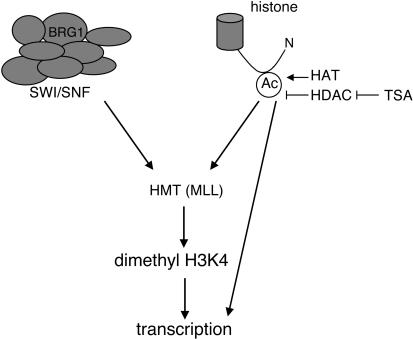Figure 6.
A model depicting the relationship of SWI/SNF-related complexes and covalent histone modifications during ZGA. Maternally derived SWI/SNF-related complexes (left) and histone acetylation (right) converge to stimulate MLL. MLL methylates H3K4, which, in turn, results in transcription. In Brg1Zp3-Cre maternally depleted embryos, dimethyl H3K4 and transcription are reduced but not abolished, because the histone acetylation input is intact and other chromatin remodeling complexes might compensate. For the same reason, TSA treatment of maternally depleted embryos increases histone acetylation and restores dimethyl H3K4 to levels of untreated controls and transcription to higher than normal levels nearly equal to TSA-treated controls. It is also likely that histone acetylation stimulates transcription in a dimethyl H3K4-independent manner (line from Ac to transcription). (Ac) Acetyl group on N-terminal tail of a core histone; (HAT) histone acetyltransferase; (HDAC) histone deacetylase; (TSA) trichostatin A; (HMT) histone methyltransferase; (MLL) mixed lineage leukemia.

